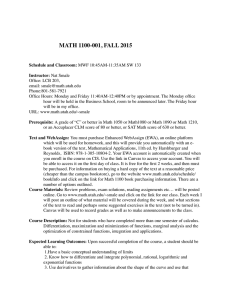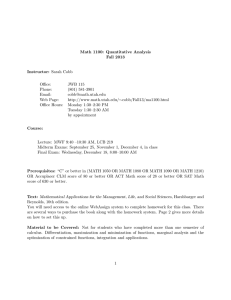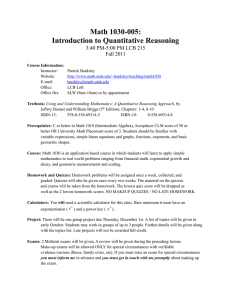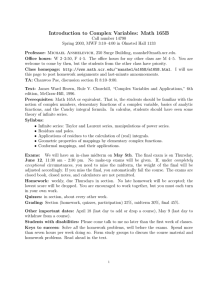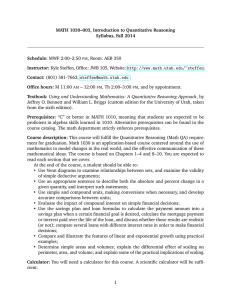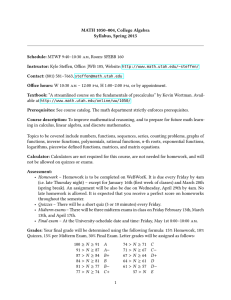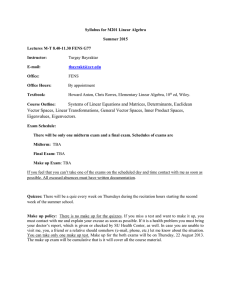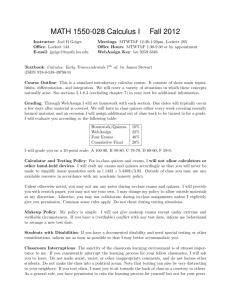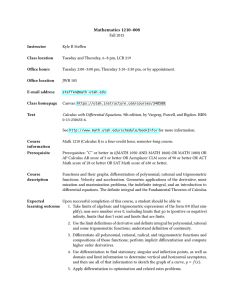MATH 1060–003, Trigonometry Syllabus, Fall 2013 Schedule: Instructor:
advertisement
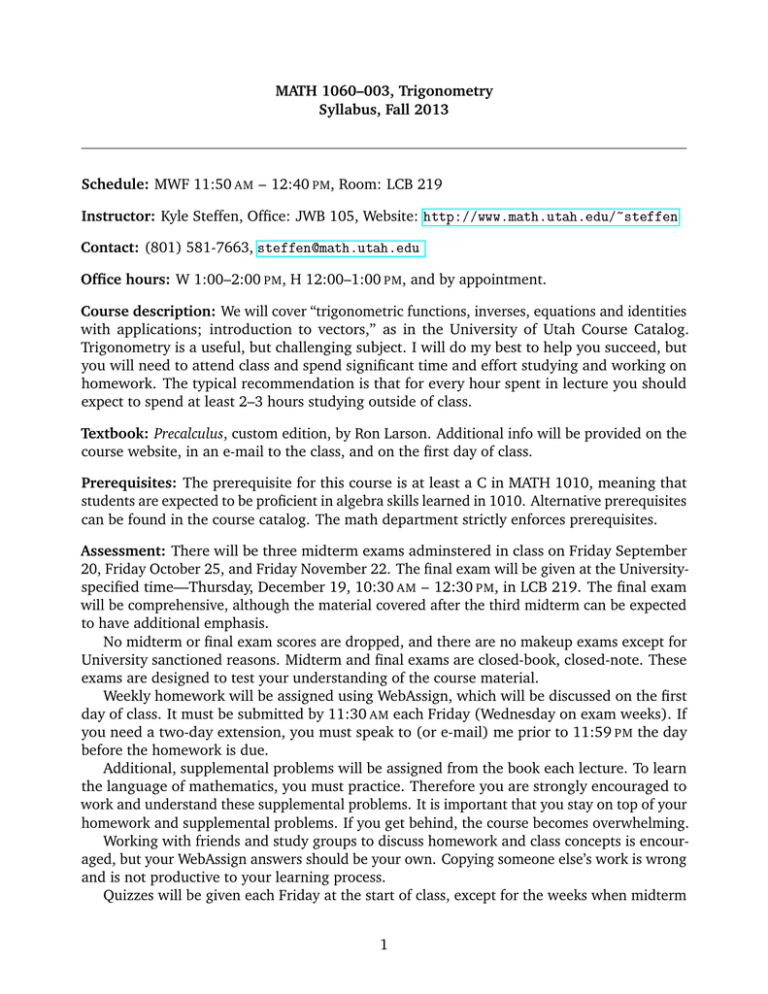
MATH 1060–003, Trigonometry Syllabus, Fall 2013 Schedule: MWF 11:50 AM – 12:40 PM, Room: LCB 219 Instructor: Kyle Steffen, Office: JWB 105, Website: http://www.math.utah.edu/~steffen Contact: (801) 581-7663, steffen@math.utah.edu Office hours: W 1:00–2:00 PM, H 12:00–1:00 PM, and by appointment. Course description: We will cover “trigonometric functions, inverses, equations and identities with applications; introduction to vectors,” as in the University of Utah Course Catalog. Trigonometry is a useful, but challenging subject. I will do my best to help you succeed, but you will need to attend class and spend significant time and effort studying and working on homework. The typical recommendation is that for every hour spent in lecture you should expect to spend at least 2–3 hours studying outside of class. Textbook: Precalculus, custom edition, by Ron Larson. Additional info will be provided on the course website, in an e-mail to the class, and on the first day of class. Prerequisites: The prerequisite for this course is at least a C in MATH 1010, meaning that students are expected to be proficient in algebra skills learned in 1010. Alternative prerequisites can be found in the course catalog. The math department strictly enforces prerequisites. Assessment: There will be three midterm exams adminstered in class on Friday September 20, Friday October 25, and Friday November 22. The final exam will be given at the Universityspecified time—Thursday, December 19, 10:30 AM – 12:30 PM, in LCB 219. The final exam will be comprehensive, although the material covered after the third midterm can be expected to have additional emphasis. No midterm or final exam scores are dropped, and there are no makeup exams except for University sanctioned reasons. Midterm and final exams are closed-book, closed-note. These exams are designed to test your understanding of the course material. Weekly homework will be assigned using WebAssign, which will be discussed on the first day of class. It must be submitted by 11:30 AM each Friday (Wednesday on exam weeks). If you need a two-day extension, you must speak to (or e-mail) me prior to 11:59 PM the day before the homework is due. Additional, supplemental problems will be assigned from the book each lecture. To learn the language of mathematics, you must practice. Therefore you are strongly encouraged to work and understand these supplemental problems. It is important that you stay on top of your homework and supplemental problems. If you get behind, the course becomes overwhelming. Working with friends and study groups to discuss homework and class concepts is encouraged, but your WebAssign answers should be your own. Copying someone else’s work is wrong and is not productive to your learning process. Quizzes will be given each Friday at the start of class, except for the weeks when midterm 1 exams are given. Quizzes will cover some of the key concepts from the homework and lectures. There are no makeup quizzes. Your two lowest assignment scores and quiz scores will be dropped. As added incentive to do your best, the dropped scores will count for some extra credit within their respective categories, which will be taken into account at the end of the semester. In general, technology (including scientific calculators) may not be used on quizzes or exams. There may be exceptions, but they will be announced in class and by e-mail ahead of time, and there will be options to receive full credit with or without technology. Extra help: • If you have questions about your WebAssign problems or the supplemental questions, please see me during my office hours. • You may also consider the Math Tutoring Center, located downstairs in LCB. The Math Tutoring Center is free (funded by student fees) and is open Tuesday, Sept. 3, through the end of finals week. Tutoring Center hours are MTWH 8:00 AM – 8:00 PM and Friday 8:00 AM – 6:00 PM. • If you want to hire a tutor (for a fee), you may find a list of tutors through the Math Department, or you may look into ASUU tutoring. • There are many resources to be found online, such as: Lecture videos on the Math Department’s website or at Khan Academy, and answers to more general questions about math on Dr. Peter Alfeld’s website. Grading: The grade will be calculated as follows: Three midterms (15% each – total of 45%), final exam (30%), quizzes (15%), WebAssign assignments (10%). University dates to keep in mind: Last day to drop the class is Wednesday, Sept. 4; last day to add is Monday, September 9; and last day to withdraw is Friday, October 25. (These dates, and more, can be found on the University of Utah Academic Calendar.) The grading scale will be as follows: 93–100 A 90–92 A87–89 B+ 83–86 80–82 77–79 B BC+ 73–76 70–72 67–69 C CD+ 63–66 D 60–62 D0–60 E Study tips: a) Study with a group, b) Attend class regularly, c) Read each section before coming to class, d) Work the assigned problems as soon after the lecture as possible. A.D.A. Statement: The Americans with Disabilities Act requires that reasonable accommodations be provided for students with physical, cognitive, systemic learning, and psychiatric disabilities. Students should contact me at the beginning of the semester to discuss any such accommodations that they may require for this course. Disclaimer: All information on this syllabus is subject to change. Students will be notified of any changes on this syllabus, course policies or course outline if they arise throughout the semester. 2
